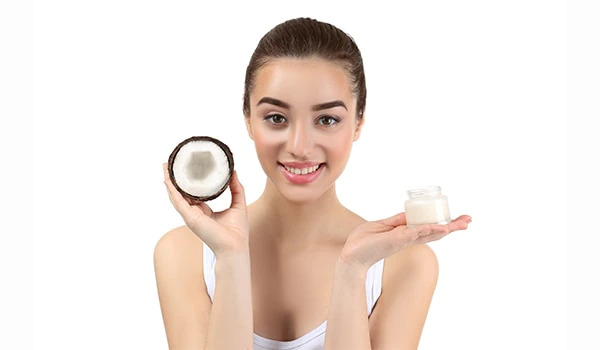These days, it has become so typical to walk into a private bathroom and find loads of skincare products (like Beauty Products)from all four corners of the toilet down to the floor.
It’s even more amazing to know that one person can use this much product on their skin – all promising the same things: defy aging, smoother skin, brighter complexion, less visible wrinkles.
Yet, people are more and more beset by a whole menu of skin issues.
This is the reason why skincare is getting a taste of its own back-to-natural revolution and coconut oil certainly has earned a place in the midst of it all.
Skin Benefits of Coconut Oil
Heated coconut oil when used for cooking has such a pleasant smell that fills up not just your nostrils but all of your senses – it’s calming and relaxing. Unsurprisingly, coconut oil has become a staple component of almost any type of skincare product, often added in as Capric[1] / Caprylic /Lauric acid which functions as an emollient or skin conditioning agent.
Other than its obvious deep skin moisturizing (like Cetaphil) properties, coconut oil also delivers the following skin benefits:

Skin Benefits Of Coconut Oil – Image/Shutterstock
- Has natural antifungal and antibacterial properties that helps treat various skin infections, including acne and other skin blemishes
- Loaded with antioxidants that help protect skin from the cell damaging effects of free radicals
- Easily assimilated by the skin and made useful for skin healing, treating and maintenance purposes
- pH balanced
- Contains very high levels of Vitamin E[2] which does good in protecting the skin and keeping it moisturized 24/7
- Has high amino acid[3] content that supports better skin synthesis and more rapid tissue repair.
Coconut oil is most especially common as an ingredient in lip balms, anti-aging moisturizers, makeup removers, and hair conditioners.
More recently, coconut oil’s use as a facial cleanser has been steadily gaining popularity.
Why Use Coconut Oil As Facial Cleanser?
The use of coconut oil as a facial cleanser can be traced back to the growing following and acceptance of the oil cleansing method, the philosophy behind which is simple: like attracts like.
In facial cleansing terms, this means that the correct way to remove excess oil from the skin is to use oil to strip it away. Sounds crazy, huh? But, many people have tried the oil method using various essential oils, and coconut oil is a favorite, and swear by the favorable results.

Best Way To Use Coconut Oil As A Cleanser – Image/Shutterstock
The oil method contests how most facial cleansing products from facial wash to toners to exfoliants have been purposely targeted to decrease the amount of oil in the skin, to dry acne and blemishes so that skin can be free from infections and irritations.
Truth is, according to this method, all these products are doing is further irritating the skin, and sending the wrong signal to skin cells that tell them to produce more oil to compensate for the lost natural oils as a result of the drying effect of these products.
The oil method takes this reasoning further, claiming that oil is not the culprit but hygiene is.
Using oil to strip dirty oil is a more viable way, it says, of cleansing the skin.
How to Make Coconut Oil Facial Cleanser?
So, if you’re eager enough to try this new skin cleansing philosophy, or at least, you’re ready to dare yourself to find out the sleeky proof, below are some ways you can try the oil cleansing method with coconut oil.
Method 1:
Straightforward use. Rinse face with lukewarm water. Take about a teaspoon of coconut oil.
Massage for at least 5 minutes. Rinse off with lukewarm water to remove the grime. Finish with cold water to close your pores.
Method 2:
Warm cloth mask method. Take an extra virgin or virgin coconut oil, a soft washcloth, and 2 small bins filled with lukewarm water.
Rinse face with lukewarm water. Pat your face dry. Take a tablespoon or two of the coconut oil and apply it to your face with a circular, massaging motion.
Once the entire facial area is covered, take your washcloth and dip it into the lukewarm water.
Take out excess water from the washcloth then spread it flat on your face.
This will produce steam which will soften the excess oil and dirt trapped in your pores and simultaneously help skin better absorb the coconut oil.
Leave on for about 5 minutes. Wipe your face gently with the washcloth. Rinse face with lukewarm water. End with cold, tap water.
Method 3:
Anti-acne coconut oil cleanser. In a jigger glass, fill about a third of the glass with coconut oil and add in a teaspoon of baking soda.
Mix just enough to cover all the baking soda in oil. Apply on the face thoroughly cleansed with lukewarm water.
Leave on for about 5 minutes before rinsing off with lukewarm water.
End with cold water. Baking soda is an effective way to balance the skin’s pH level and get acne under control.
Read Also: Anti-Aging Creams v/s Moisturizers
FAQ’s:
Que: Is coconut oil good as a cleanser?
Ans: Yes, safe to use when cleansing your face, but it’s also quite effective and offers numerous benefits to your skin.
Que: Does coconut oil remove dirt from skin?
Ans: Yes, it is the most effective way to remove dirt, impurities, and yes—even oil from your face.
Que: Does coconut oil whiten face?
Ans: Yes, coconut oil can do wonders for improving overall skin tone and making your skin look lighter.
Que: Is coconut oil good for wrinkles?
Ans: Yes, regular use of coconut oil can help stimulate collagen production in the body thus reducing wrinkles.
Conclusion
Using coconut oil as a skin cleanser certainly has a promising claim to it.
Skincare regimens, however, result in different things among different people and it certainly takes a little bit of curiosity and a dash of courage to brave this oily recommendation.






 This article changed my life!
This article changed my life! This article was informative.
This article was informative. I have a medical question.
I have a medical question.
 This article contains incorrect information.
This article contains incorrect information. This article doesn’t have the information I’m looking for.
This article doesn’t have the information I’m looking for.